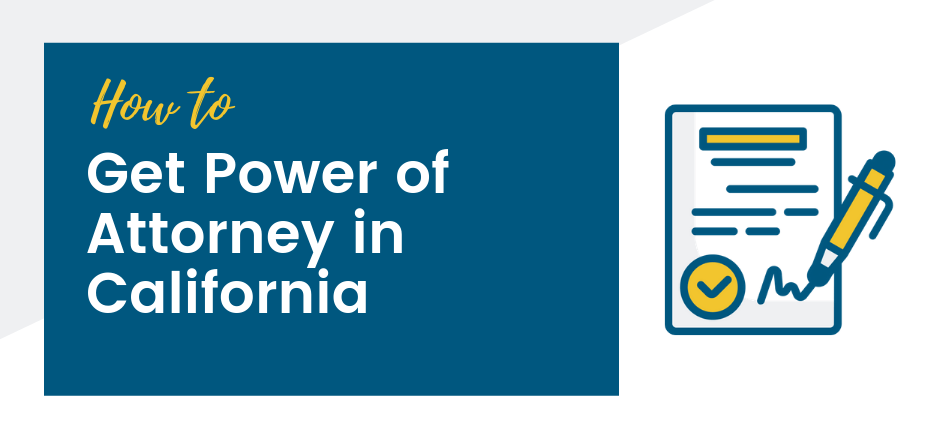How to Get Power of Attorney in California
A power of attorney (POA) is a document that allows a person to manage your affairs if you become unable to do so. If you believe you may need to get a power of attorney, it’s important to understand the different types available as well as how to get one successfully. Here’s how to get power of attorney in California.

How to Get Power of Attorney in California
Power of Attorney, or POA, is most often utilized when the individual handing over power has concerns about their ability to make legal decisions for themselves. This includes financial decisions (such as managing money), legal decisions (such as defending oneself in court) and medical decisions (such as when to stop life-saving interventions).
An individual who is applying for POA is called the “agent.” The person who is handing over the right to make decisions is called “the principal.” Agents must prove the POA is in the best interests of the principal, and/or that they agree before the document can be made official.
If you are considering seeking a POA for yourself or for someone you love, you must be prepared to jump through several hoops prior to approval. We’ll explain this topic, and how to get power of attorney in California, in the article below.
Is Power of Attorney What You Need?
A power of attorney is arranged in advance by people who are sick, in end-of-life care, or who simply want to ensure their needs are protected as they age. It can also be granted in special situations when it makes logical sense for someone else to make decisions on another party’s behalf, such as a spouse.
Rarely, POAs may also be used to grant decision-making rights before a principal is absent (out of the country for an extended period of time) or otherwise unable to handle their own affairs (jailed). For example, a military spouse may seek partial POA for a spouse who is being deployed in case they become incapacitated.
The POA system is intended to serve as a failsafe to help the principal ensure their rights and ability to take care of their affairs is protected. It is not intended to allow someone to “step in and take over” simply because they disagree with the other party’s lifestyle.
Furthermore, the principal must prove they are of sound mind and body before they can legally agree to a POA. Because POA is, in fact, a legal decision, someone who is considered unfit cannot agree. If the principal in your case is already unfit, alternatives like guardianship, conservatorship, and guardian ad litem status may be a better option. Ask your lawyer for an individualized recommendation.
Talk About It
Whether you are the agent seeking power or the principal, your first step should always be to discuss it with the other party. Does everyone agree to the POA? Why is POA the best option in this case? Does the agent or principal have special concerns about the exchange of power? These concerns should be resolved before you fill out any legal documents or submit a request.
If there are disagreements, it may be best to work with a lawyer who can protect the rights of the principal while helping to explain concerns to the agent. Your primary goal should always be to uphold the rights of both parties at all times.
Decide on the Type of POA You Need
In the state of California, POAs come in three specific formats. Each format addresses the principal’s rights and the agent’s responsibilities in a very specific way, granting them more or less power.
- General Power of Attorney: A General Power of Attorney grants agents the highest level of authority and decision-making power. This includes legal decisions and financial decisions. It does not, however, give the agent the right to make medical decisions for the principal.
- Limited Power of Attorney: A Limited Power of Attorney grants the agent only specific decision-making powers. These powers are outlined within the LPOA document and are most often decided by the principal. For example, someone might assign their accountant an LPOA if they want the accountant to handle their financial accounts during an extended stay overseas.
- Power of Attorney for Health: A Power of Attorney for Health grants the agent the right to make decisions about medical care. This includes treatment options, changes to advance medical directives, procedure approval, and even, in the event of the principal’s death, the decision to donate organs. Generally, a POAH only becomes active when the principal is incapacitated.
An agent may be granted one or more of these POA types at the same time. For example, an adult who has dementia may grant an adult child both a GPOA to manage their finances as well as a POAH in the event of incapacitation.
Filling Out the Power of Attorney Form
If both the agent and the principal agree that POA is in the best interests of all parties, your next step is to fill out the correct forms. The University of Santa Barbara California (USBC) has a printable “Uniform Statutory Form Power of Attorney” form adhering to all requirements under California Probate Code Section 4401 at this link.
Please note that this form must be filled out in the presence of an official witness, such as a lawyer, a judge, a notary public, or a county clerk. This individual must not only witness the signing but also include a certificate of acknowledgment of notary public to make the document official.
At the top of the form, you’ll find a short passage with several blanks. Have the principal add their name to the blank labeled “(your name and address).” Add the agent’s name(s) to the blank section labeled “(name and address of the person appointed, or of each person appointed if you want to designate more than one).”
Below, you’ll find a shortlist of grantable powers. Have the principal label each power they wish to grant in the small blank spot to the left of each power. Strikeout any powers the person does not wish to grant. If there are special instructions or nuances, add these in the next section titled “special instructions.”
Next, look for the line stating “This power of attorney will continue to be effective even though I become incapacitated.” If the principal does not wish for the power to continue after incapacitation, strike this out, too. Otherwise, leave it as-is.
In the section labeled, “Exercise of power of attorney where more than one agent designated,” you will find a blank line. If you wish POAs to make decisions collectively, write “collectively” here. If you want each POA to have the right to decide on matters alone, write “separately” instead.
Lastly, fill in the date at the bottom of the form and have all parties sign where applicable. Provided that your POA is valid and that it was witnessed by an officiant, it becomes legally official immediately upon signing.
Are you in search for a certified attorney to represent you?
Let us help you find one today!


